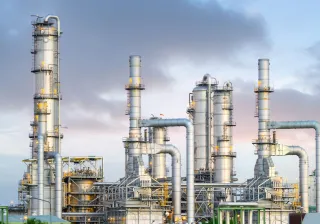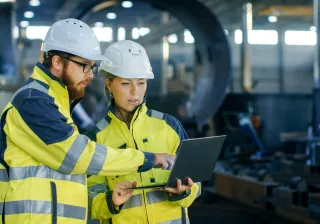Hydrogen is a versatile energy carrier that will play a crucial role in driving carbon neutrality. But introducing hydrogen into existing systems, processes and value chains is not without its challenges. VTT’s webinar, Tackling material challenges in a hydrogen economy, explores hydrogen-related material challenges and how to make the right choices in a hydrogen economy.
Hydrogen is a key enabler of the energy transition. For a successful transition to hydrogen, we must ensure that everything from production, storage and transport to use and conversion will work seamlessly together. This poses a challenge as the existing processes and machinery are designed for fossil-based raw materials. Introducing hydrogen into the equation may affect the durability, reliability and maintainability of infrastructure, machinery and equipment.
This is why many companies are left wondering: can they use their equipment and machinery in a hydrogen economy?
Right materials are key to safe and efficient use of hydrogen
The good news is, we don’t have to reinvent the wheel to harness the potential of the hydrogen economy – we just have to make use of existing infrastructure and equipment in new ways. We must also acknowledge that utilising hydrogen safely and effectively requires a deep understanding of materials and their performance.
To explore the hurdles and opportunities presented by hydrogen, VTT organised a webinar on the material challenges in hydrogen economy. In the webinar, VTT scientists shed light on different green hydrogen production technologies and expand on the issues related to the storage and transport of hydrogen as well as the usage of hydrogen as a fuel.
Here are five key takeaways from the webinar:
- The biggest challenge of the energy transition is how to produce green hydrogen. According to VTT’s Senior Scientist Ville Saarinen, there are three main commercial electrolysis technologies available, all with their own set of pros and cons. These are alkaline electrolysis, proton exchange membrane electrolysis and solid oxide electrolysis.
- Materials play a key role in the safe and efficient use of electrolysers. In addition, materials research is needed to develop electrolysis systems with significantly higher efficiency.
- Producing green hydrogen alone is not enough. Hydrogen must also be put to good use. To do that, we need to be able to store and transport it. Currently, there’s no infrastructure to transport large quantities of hydrogen from one place to another.
- We must either repurpose existing infrastructure such as natural gas pipelines or build completely new pipelines.Material knowledge and an understanding of material performance is needed to make the energy infrastructure of the future safe and durable.
- Finally, hydrogen must be further processed into products so it can be used in processes. To achieve that, we must work out how to replace fossil-based raw materials with hydrogen, how to use hydrogen e.g. to produce e-fuels like ammonia, and how to select materials that enable the transition.
VTT has the expertise and the infrastructure to tackle the material challenges of a hydrogen economy
At VTT, we help companies explore the possibilities of hydrogen in their operations, be it hydrogen production, storage, transport, or use. We help you answer critical questions and make a successful transition to a clean energy future. Our expertise covers everything from material solutions for new processes to making existing plants suitable for hydrogen.
Our unique research and technology infrastructure for energy and hydrogen includes:
- Clean energy pilot platform focused on hydrogen electrification and renewable fuels
- End-to-end research facilities for carbon neutrality in transport and industries
- Innovation platform for new solutions for hydrogen, electrification and renewable fuels
- Materials performance infrastructure for the development of sustainable material solutions for extended lifespan and improved operational efficiency
We offer broad expertise when it comes to the ageing and failure mechanisms of materials in various industrial processes, applications and operating environments. By combining our material knowledge, experimental laboratories, numerical simulations, and scientific competence into one solution, VTT ProperScan, we can offer you concrete recommendations for material choices.
Investing in a hydrogen economy is a priority in Finland – the country aims to become the European leader in a hydrogen economy. This means governmental support is available for operators and investments in the hydrogen sector.
As a result, there's never been a better time to seize the opportunities presented by hydrogen.
Get in touch now to tackle the material challenges in a hydrogen economy, together.
Watch the webinar






